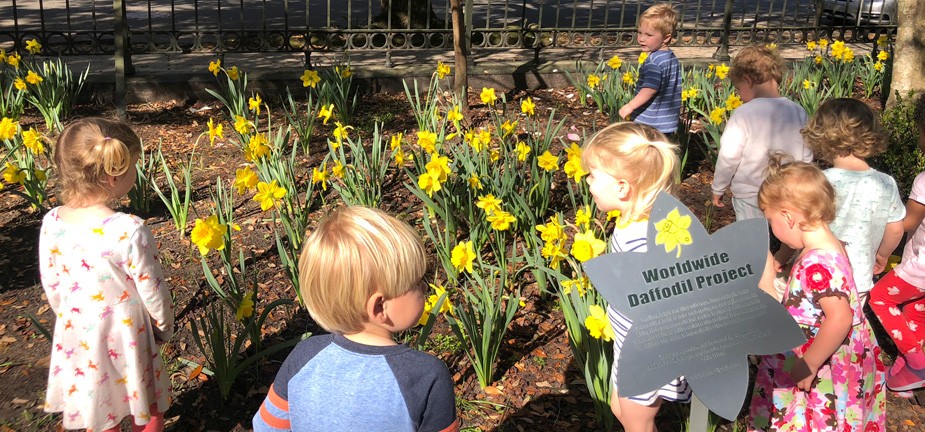
This spring, as Ashley Hall’s campus bloomed with flowers, a new profusion of daffodils rose triumphantly near the Rutledge Avenue fence. Planted in December as part of The Daffodil Project, which aspires to build a worldwide Living Holocaust Memorial by planting 1.5 million daffodils in memory of the children who perished in the Holocaust and in support for children suffering in humanitarian crises in the world today, the striking trumpet-shaped blooms heralded the rebirth of spring and a deeper hope of a world filled with peace. Earlier this week, philanthropist and social activist Anita Zucker echoed that same vital message during a special virtual Assembly with students.
“What I have enjoyed most about seeing The Daffodil Project become a reality at Ashley Hall is the way it has been embraced by the entire campus,” shared Logan Tunick ’21, who spearheaded efforts to bring the project to the School. “I continue to be in awe of the teachers and students who have supported me throughout this year with this initiative.” After applying last summer to serve as a student ambassador on the Remember Project with the Charleston Jewish Federation, Tunick learned of The Daffodil Project. Immediately, she knew its message of hope would resonate with the Ashley Hall community.
“It is important for Holocaust awareness to be implemented in a visual way to Ashley Hall girls, especially in this time of heightened antisemitism and growing hatred,” Tunick continued. “As a School that is tasked with the responsibility of shaping the female leaders of tomorrow, it is crucial that we present a message of hope and renewal for a brighter future. The daffodil is resilient and returns with a burst of color each spring. It signifies renewal after darkness and hope after a rough period, such as during a pandemic.”
Zucker emphasized the same message this week during her virtual presentation to Upper School students. An ardent supporter of The Daffodil Project, Zucker spoke of the horrors of the Holocaust via the experiences of her family, many of whom perished in ghettos or concentration camps. “The daffodils bring back memories of those whom we lost so long ago, and it is so important that none of these victims ever be forgotten,” she said. “The lesson is that as long as any are persecuted, no one is free. We have to remember people of all kinds all over the world who continue, sadly, to be persecuted.”
Zucker honored the courageous ability of Holocaust survivors to overcome the great odds against them, with her parents eventually moving to America to build new lives motivated by hope and inspired by tikkun olam, Hebrew words that mean to “repair the world.” “My family and I consider tikkun olam the values we choose to live by,” Zucker emphasized. “We choose to do work that repairs the world, whether it is through our philanthropy, our volunteer work, our work with children in schools, or work in health care. To us it is finding ways to give people access and opportunities. We want them to be able to get education because we can repair their world if they can be educated, and we want to make sure we provide those kinds of opportunities for others.”
Zucker’s moving speech was impactful to many students, who were immediately inspired by her passion for philanthropy and social justice. “It was important to have Ms. Zucker speak to Ashley Hall because I feel that a voice and story are much more powerful than a history lesson filled with numbers,” said Tunick. “Going forward, I hope that The Daffodil Project continues to grow and bring light to our campus in years to come.”
